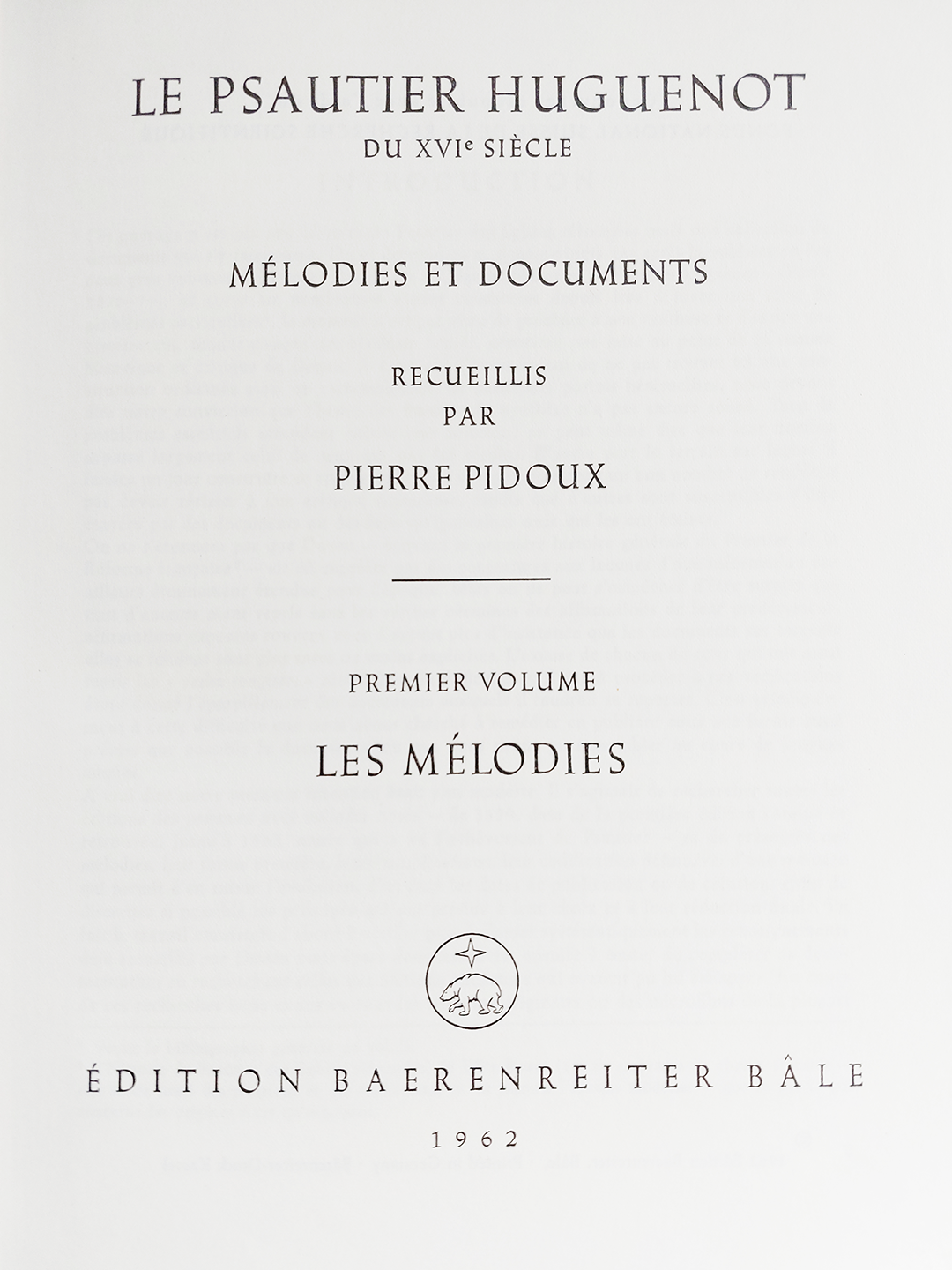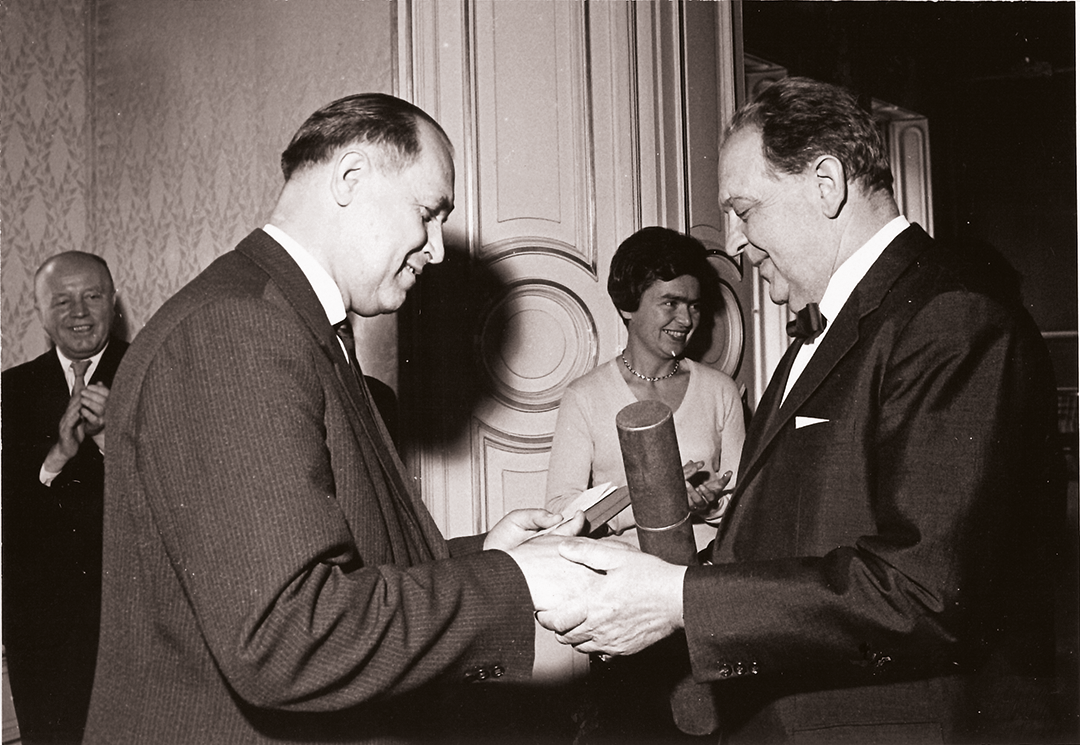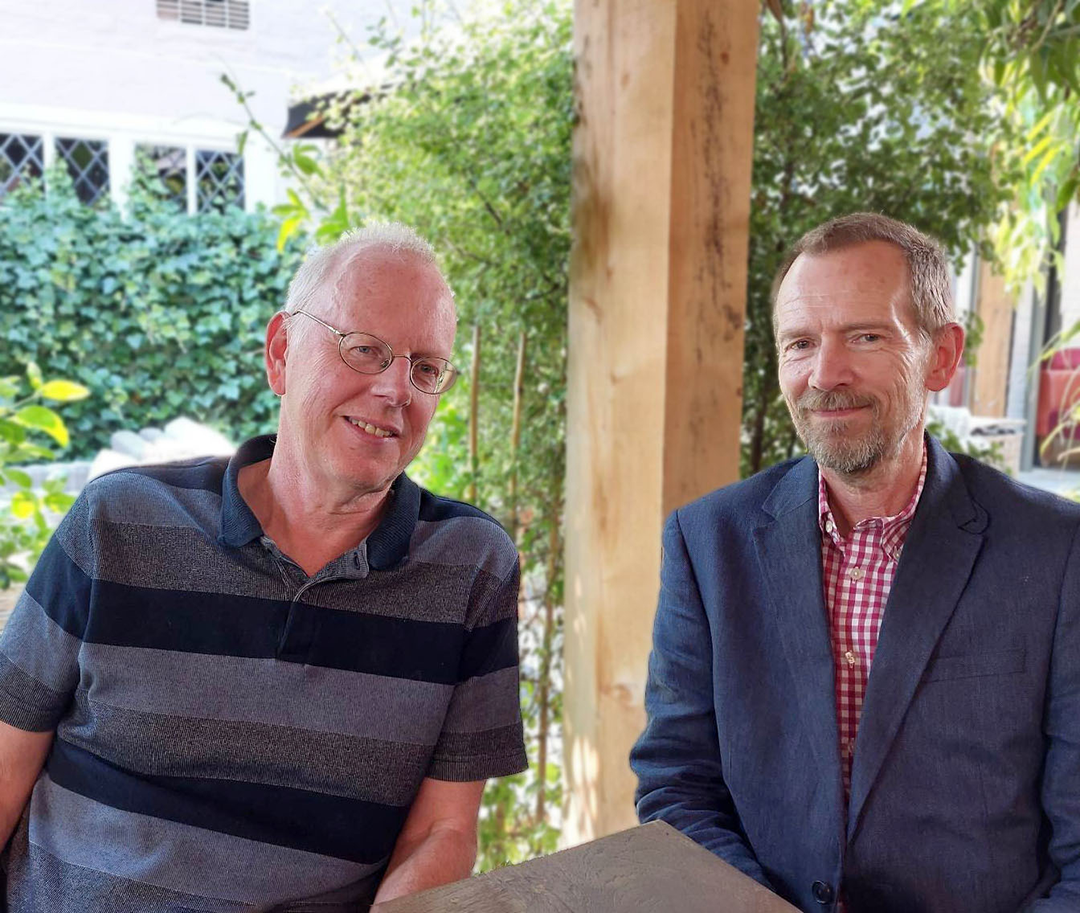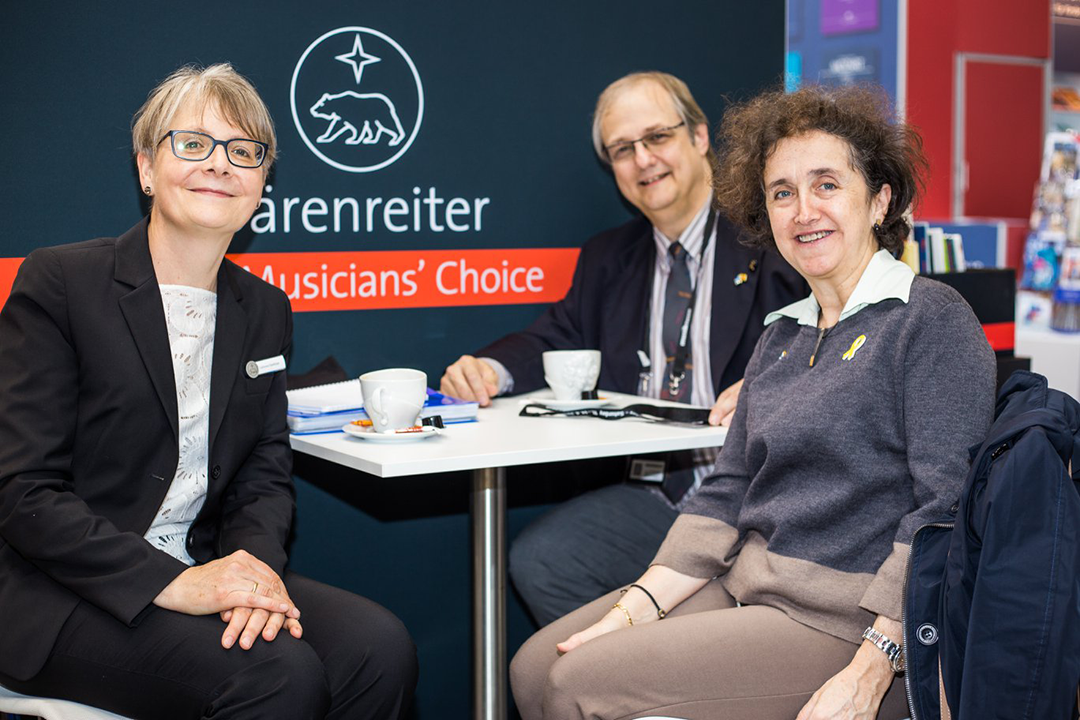Kassel / Basel / London / New York / Prague
Bärenreiter – a publisher of global standing
Bärenreiter Basel
Shipping Bärenreiter’s titles across the globe of course required corresponding distribution structures. Bärenreiter’s first efforts in this regard date back to the National Socialist period and were a direct consequence of the dictatorship’s repressive measures. While the foreign branch set up in 1939 by Karl Vötterle’s Jewish friend Albert Dann first in Haifa and then in Tel Aviv was only short-lived due to the outbreak of the War, the founding of the legally and economically independent Basel branch of Bärenreiter was intended to ensure the publishing house’s survival – at the time, the Kassel headquarters were under threat of confiscation by the National Socialists. Armed with a rare exit permit, Vötterle had thus travelled to Switzerland on a secret mission in March 1944, taking all Bärenreiter’s publishing rights with him. His numerous helpful contacts served him extremely well in this venture: Ruth Majer, a trained bookseller and the sister of Marianne Majer, a member of the Basel Viola da Gamba Quartet, agreed first to register the publishing house in Basel within a day and then to manage it.
The founder of the Schola Cantorum Basiliensis, Paul Sacher, provided advice and support, another friend lent Vötterle the required Swiss francs, and August Wenzinger’s parents provided the publisher with temporary storage space. Vötterle was thus prepared for an emergency, although it then occurred in a form he had not anticipated: when Bärenreiter’s Kassel premises burned down in March 1945, “the thought that a small, functioning Bärenreiter publishing house existed in Basel was a comfort and help” (Haus unterm Stern, p. 318). Ruth Majer managed the business until 1960; her successors expanded the branch into a major Swiss retailer, and Peter G. Isler in particular has rendered outstanding services since 1988 as Bärenreiter Basel’s Managing Director and as the person responsible for the French-speaking European markets.

Pierre Pidoux, Le Psautier Huguenot, Cover
Until 2021, when all publishing rights were transferred to the parent company in Kassel, editions of music and musicological texts such as Pierre Pidoux’s standard work Le Psautier Huguenot were published there; above all, however, Bärenreiter Basel was the first port of call in Switzerland for Swiss composers such as Willy Burkhard, Klaus Huber, Rudolf Kelterborn, Beat Furrer, Andreas Lorenzo Scartazzini and Dieter Ammann. And in Bärenreiter Basel’s anniversary year 1994, history repeated itself: as Chairman of the Board of Directors of Bärenreiter-Verlag Basel AG, Leonhard Scheuch, Swiss lover of all things Czech and a dedicated supporter of contemporary music, founded a subsidiary of Bärenreiter Basel in Prague that paved the way for the privatisation of the Czechoslovakian state publishing house Editio Supraphon. Bärenreiter Praha is thus a “child” of freedom – of the freedom that Scheuch’s father-in-law Karl Vötterle had sought and found in Switzerland at a time of severe hardship.
Cooperating with Czechoslovakian music publishers



Long before Bärenreiter had a branch in Prague, it had already established close contacts with the countries of what was then the Eastern Bloc – especially Hungary, Romania and above all Czechoslovakia: “A music publisher rooted in the singing movement could not but love Bohemian minstrelsy, the soil that nourished the art of Dvořák, Smetana, Janáček and Martinů”, Vötterle wrote in Haus unterm Stern (p. 280f.), and thus the first informal meeting with representatives of the Czechoslovakian foreign trade company Artia Prague took place as early as 1955 in Bad Schandau. These talks became a forum for true encounter at the time of the Cold War and marked the beginning of a genuine partnership in which Bruckner-Verlag – which had moved to Kassel that same year and now was named Alkor-Edition – and its director Fritz Oeser played an important role. Among other things, Alkor took over the distribution of the Prague Dvořák edition, all works by Smetana and compositions by the Slovak Ján Cikker, and via Kurt Honolka’s libretto translations, numerous operas by Czechoslovakian composers, first and foremost Smetana’s The Bartered Bride, found their way onto German-speaking stages. In 1965, Karl Vötterle was awarded the Golden Medal of the ČSSR in recognition of his efforts, which were anything but self-evident at the time: “There are no diplomatic relations between our countries,” said Vojtěch Strnad, the director of the State Music Publishing House, “but Czechoslovakia has a good ‘consulate’ in Kassel in the field of culture” (Das Bärenreiter-Werk 14, 1965, p. 12f.). And in 1974, yet another event that was to determine the course of the publishing house took place on Czechoslovakian soil: at the Janáček Festival in Brno, the young Barbara Vötterle and the Zurich dramaturg Leonhard Scheuch met for the first time. The couple married in 1975 and after Karl Vötterle’s death not only took over the running of the publishing house, but also continued to cultivate Bärenreiter’s special relationship with Eastern Europe. The fact that the takeover of Editio Supraphon in 1994 was a “matter close to Bärenreiter’s heart”, and that Bärenreiter Praha is now a permanent fixture within the publishing group, thus requires no further explanation.
Bärenreiter Limited
The gates to the Western world were thrown open in London, and once again it was Vötterle’s friend Albert Dann who took the decisive step. He had returned to Europe with his family after the War and from 1948 to 1956 ran a Bärenreiter agency in West Hoathly (between London and Brighton). Bärenreiter enjoyed close links with the British Isles in other ways, too: for example, Vötterle had stayed in touch with the music collector Paul Hirsch and with Otto Haas, the former owner of the Berlin antiquarian music store Liepmannssohn, both of whom had fled to England during the Nazi regime. He was also acquainted with Rolf Gardiner, the father of the conductor John Eliot Gardiner, who had close ties to the German singing movement. Vötterle’s relationship with the Jewish musicologist Adolf Aber, who later became director of publishing at Novello & Co, proved particularly fruitful. Aber brought Bärenreiter and the long-standing British publisher together; not only was a large exhibition about the German publishing house held in Novello’s offices in October 1958, but from 1957 onwards Novello also handled the distribution of Bärenreiter publications in Great Britain, Ireland and the Commonwealth nations. The responsibility for this lay in the hands of Elfriede Lauezzari-Pap, who eventually also took over the management of the foreign branch Bärenreiter Ltd., which was founded in 1963. With relentless tenacity, Lauezzari-Pap saw to it that Bärenreiter’s editions found their way as far as Australia, New Zealand, South Africa and Southeast Asia – under conditions that bore no comparison with those of today’s globalised world, as pointed out by Christopher Jackson, who joined Bärenreiter Ltd. (now based in Hitchin, Hertfordshire, 35 miles north of London) in 1977 and has been the branch’s Managing Director since 1986: “Our communication with customers, especially those on the other side of the world, took a lot of time back then. An airmail letter took about ten days to arrive from Australia, our reply took the same amount of time, and another ten days passed before we finally received the order. The whole process easily lasted for more than an entire month.”

Patrick Abrams and Christopher Jackson 2023, Bärenreiter Limited
In the 1990s and 2000s, Patrick Abrams, who joined Bärenreiter Ltd.’s team in 1981 and is now its Associate Director, made a significant contribution to expanding and cultivating Bärenreiter’s personal contacts with dealers, libraries, orchestras, opera houses and conductors across the globe through his extensive travels abroad. In 1990, he experienced just how widely known the name “Bärenreiter” already was on a visit to South Africa: “As I was waiting at a bus stop somewhere in the middle of nowhere, a man joined me and we started talking. He asked me what had brought me to South Africa, and I replied – assuming that this would put an end to the conversation – that I was travelling for a German classical music publisher. ‘For which one?’ I told him, whereupon when he pulled the Bärenreiter piano score of Bach’s Christmas Oratorio out of his bag. He was on his way to a rehearsal at the cathedral!” Since 1990, Bärenreiter Ltd.’s distribution has operated from Harlow, about 28 miles northeast of London. Now, of course, the company has long since arrived in the digital age: in 2015, Abrams discovered the short message service Twitter, and since then has been in charge of Bärenreiter’s Twitter account. He is passionate about cultivating connections with artists all over the world via this channel.
Édition Bärenreiter France
Almost simultaneously with Bärenreiter Ltd., a French branch was established in 1963, Édition Bärenreiter Paris, run by Karl Vötterle’s daughter Maria and her husband Michel Bernstein, a French record producer. In 1970 the company moved to Tours, but was abandoned in 1980 when Maria Bernstein resigned as a limited partner of Bärenreiter Verlag. France was subsequently served by Bärenreiter Basel for many years; today, this sales region falls within the remit of the headquarters in Kassel.
Bärenreiter in the USA
For a long time, Bärenreiter’s efforts to gain a foothold in the United States of America failed to achieve much success. In 1969, Karl Vötterle wrote in Haus unterm Stern (p. 320) that the task of establishing a functioning “foreign branch in this world that is unusually open to Bärenreiter’s work” still lay ahead of him. At least Bärenreiter’s long-time chief editor, the musicologist Wolfgang Rehm, was able to ascertain on a trip to the States in 1970 that the MGG and all complete edition volumes published by Bärenreiter up to that point had already found their way into the major American libraries

Igor Resnianski, Petra Woodfull-Harris and James Litzelman at the 2018 National Conference of the Music Teachers National Association in Orlando, FL
One of the companies Bärenreiter probably owed this to was Theodore Front Musical Literature. Front, who had emigrated from Germany in the 1930s, had founded his business in Los Angeles in 1961; he used to make regular trips to Europe with a dozen specially made suitcases that he filled up with the publications of various publishing houses, including those of Bärenreiter Verlag, single-handedly bringing them to the U.S. However, it was Bärenreiter’s collaboration with George Sturm and Robert Walls that proved to be the decisive step towards marketing Bärenreiter’s editions more intensely in the States. In 1980, Sturm became Bärenreiter’s consultant on all issues concerning U.S. copyright, visiting opera houses and orchestras and editing the magazine MadAminA!, which was instrumental in promoting orchestral and stage works. It was Sturm who introduced Bärenreiter to Bob Walls and his company Foreign Music Distributors (F.M.D.), with whom Bärenreiter signed a distribution contract in 1984. Walls made it easier for American music dealers to get hold of Bärenreiter editions, thus ensuring a greater visibility and wider distribution of Bärenreiter’s titles in the United States. The English catalogues and product directories produced by Walls played a key role in this process. In 1986, at Walls’ instigation, a very successful piano reduction of Handel’s Messiah was published with the text underlay solely in English, and a year later an edition of Mozart’s piano sonatas with an exclusively English-language cover and preface followed – a sign of Bärenreiter’s increasingly international orientation and a milestone in the development towards multilingualism as standard in all Bärenreiter editions. A good ten years later, the model of exclusive foreign representation had had its day; Walls decided to give up wholesale trade and specialise in the distribution of orchestral material instead. The contract with F.M.D. was terminated in 1996, and from that point onwards it proved more advantageous for Bärenreiter to serve the North American music market directly from Kassel.
International marketing and sales
Sales to those countries that do not fall within the remit of a foreign branch are handled by Bärenreiter’s headquarters in Kassel. In the 1990s, the sales department was divided into national and international areas of responsibility. This made it possible to build and cultivate stable dealer networks for the long term in the various European countries, the USA, and the Far East, and conversely means that customers have their fixed contact persons at Bärenreiter. The extent to which these mutual relationships contribute to successful cooperation is illustrated, for example, by the awarding of the 2017 “Don Eubanks Sales Rep Award” – presented by the US Retail Print Music Dealers Association “for excellence and outstanding service” – to Bärenreiter’s Petra Woodfull-Harris.

Catriona Glatthaar with Isabel Audenis and Carles Gumi at the Frankfurt Music Fair 2018
A further key factor in Bärenreiter’s international success is the department’s professionalism: a degree in music, for example, is helpful for marketing, as is a native proficiency in English – thus Catriona Glatthaar carries out important translations for Bärenreiter’s catalogues and social media advertising alongside other tasks –, as is intercultural competence when dealing with Asian customers. Printed music is a cultural good, and as such its worth also needs to be communicated to musicians and scholars in conceptual terms. Direct contact with (end) customers, working with dealers in a spirit of partnership, and the presentation of the editions’ content, which is sometimes also done jointly by the editors and copyeditors on lecture tours, are all indispensable in convincing customers of the relevance and value of Bärenreiter’s publications.

Corinne Votteler and John Zhang, Sinjo Trading & Consulting, at the 2016 Music China in Shanghai
Bärenreiter in Japan and China
The different conditions on which the Kassel-based international sales department has been able to build since the 1990s are illustrated vividly by the Asian markets, which since 2003 have been overseen by the current Director of International Marketing & Sales, Corinne Votteler. Bärenreiter had already been in contact with Japan since 1949, namely with Academia Music in Tokyo, a company that started to import classical sheet music and books from Europe shortly after the Second World War and remains an important partner for Bärenreiter to this day. The 1970s then saw the signing of highly successful licensing agreements with Japanese publishers, including Zen-on and Ongaku no Tomo.
In 1981, with the financial support of the German Federal Ministry of Economics, the first “German Music Fair” was held in Japan; it was attended by Wolfgang Matthei, Bärenreiter’s then authorised representative. Bärenreiter was a regular exhibitor for the close to twenty years the fair ran. Ties with the Japanese market have thus existed for a very long time and are cultivated intensely in person through regular visits.
The case is quite different in China: it was Wendelin Göbel who made the first trip to the then still very foreign world of the People’s Republic in 1999 in his capacity as director of publishing. On that occasion, he was unable to find a single original Bärenreiter edition there, not even in the library of the Central Conservatory of Music in Beijing, the country’s largest conservatory. Due to China’s low standard of living at that time and the fact that all imports of sheet music had to (and still have to) be handled by one of the large import companies (direct sales to music stores are not possible), it became apparent that “conquering” the Chinese market would require patience. Nevertheless, the “Music China” trade fair, which has been held in Shanghai since 2002, has grown in the meantime and now occupies seventeen large halls instead of two small ones. China’s important music libraries have gradually acquired Bärenreiter complete works editions; direct relationships with music dealers have also been established. The “Bärenreiter Urtext” brand has been launched, and Bärenreiter is currently experiencing its greatest growth in China. Recently, a Chinese supplement to the Sassmannshaus Violin Method was published with the support of Kurt Sassmannshaus, who regularly visits the Far East with his educational “Starling Preparatory String Project” and teaches numerous students from China at the Cincinnati Conservatory.
Major developments and changes
In the first decades after the Second World War, Bärenreiter Verlag’s efforts to break into the international markets focused on cooperations with institutions and musicologists as well as on the establishment of branch offices – at that time, its network of foreign dealers was only rudimentary. In the last forty years, however, Bärenreiter’s staff have travelled extensively in Europe, North America, and Asia and established good connections to the printed music trade in key markets for Western classical music. The Frankfurt Music Fair, which was first held in 1980 and for three decades remained the largest international trade fair for music publishers, also played a significant role in cultivating contacts. The fair decreased in importance in more recent years and has not been held at all since the outbreak of the pandemic, a circumstance that is symptomatic of the radical changes in the wider market. While Bärenreiter still generates by far the largest share of its sales from the trade in sheet music, the number of music dealers and especially of local music shops has declined across the globe; the market is dominated by a few large companies. At the same time, digitisation is becoming more and more important in all areas of the music industry. Accordingly, Bärenreiter’s sales activities are now increasingly aimed at communicating with musicians directly via social media. However, personal encounters – for example at national and international conferences, association meetings, and concerts, but also during visits to dealers and institutions such as opera houses, orchestras, libraries, and music academies – remain indispensable in ensuring that in future, too, not an hour will pass without music being played somewhere in the world from a work published by Bärenreiter.
Gudula Schütz & Petra Woodfull-Harris